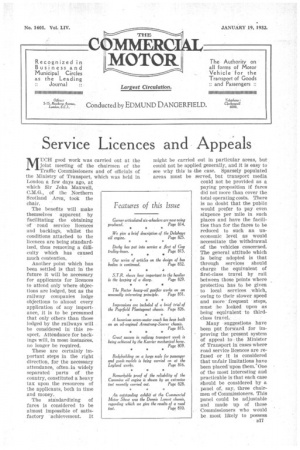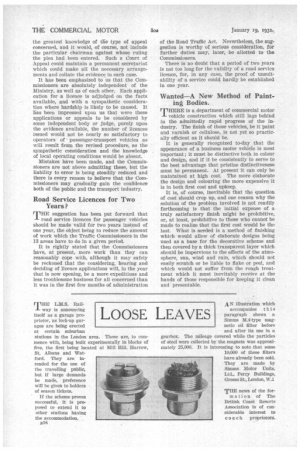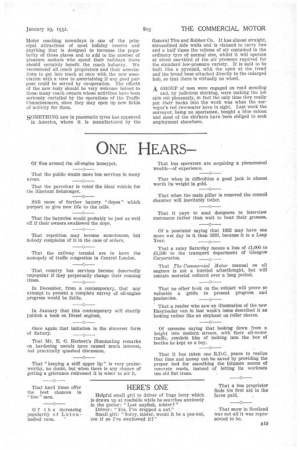Service Licences and• Appeals
Page 35

Page 36

Page 37

If you've noticed an error in this article please click here to report it so we can fix it.
UCH good work was carried out at the joint meeting of the chairmen of the Traffic Commissioners and of officials of the Ministry of Transport, which was held in London a few days ago, at which Sir John Maxwell, C.M.G., of the Northern Scotland Area, took the chair.
The benefits will make themselves apparent by facilitating . the obtaining of • road service licences and backings, whilst the conditions attached to the licences are being standardized, thus removing a difficulty which has caused much contention.
Another point which has been settled is that in the future it will be necessary for applicants for licences to attend only where objections are lodged, but as the railway companies lodge objections to almost every application of any importance, it is to be presumed that only others than those lodged by the railways will be considered in this respect. Attendance for backings will, in most instances, no longer be required.
These 'are certainly important steps in the right direction, for the necessary attendance, often. in widely separated parts of the country, constituted a heavy tax upon the resources of the applicants, both in time and money.
The standardizing of fares is considered to be almost impossible of satisfactory 'achievement. It might be carried out in particular areas, but could not be applied -generally, and it is easy to see why this is the ease. Sparsely populated areas must be served, but transport media could not be provided as a paying proposition if fares did not more than cover the total operating costs. There is no doubt that the public would prefer to pay even sixpence per mile in such places and have the facilities than for the fares to be reduced to such an uneconomic level as would necessitate the withdrawal of the vehicles concerned. The general attitude which is being adopted is that through services should charge the equivalent of first-class travel by rail between those points where protection has to be given to local services which, awing to their slower speed and more frequent stops, must be looked upon as being equivalent to thirdclass travel.
Many suggestions have been put forward for improving the present system of appeal to the Minister of Transport in cases where road service licences are refused or it is considered that unfair limitations have been placed upon them:One of the most interesting and practicable is that each case should be considered by a panel of, say, three chairmen of Commissioners. This panel could be adjustable and made up of those Commissioners who would be most likely to possess the greatest knowledge of tile type of appeal concerned, and it would, of course, not include the particular chairman against whose ruling the plea had been entered. Such a Court of Appeal could maintain a permanent secretariat which could make all the necessary arrangements and collate the evidence in each case.
It has been emphasized to us that the Commissioners are absolutely independent of the Ministry, as well as of each other. Each application for a licence is adjudged on the facts available, and with a sympathetic consideration where hardship is likely to be caused. It has been impressed upon us that were these applications or appeals to be considered by some independent body or judge, purely upon the evidence available, the number of licences issued would not be nearly so satisfactory to operators of passenger-transport vehicles as will result from the revised procedure, as the sympathetic consideration and the knowledge of local operating conditions would be absent.
Mistakes have been made, and the Commissioners are not above admitting these, but the liability to error is being steadily reduced and there is every reason to believe that the Commissioners may gradually gain the confidence both of the public and the transport industry.
Road Service Licences for Two Years?
THE suggestion has been put forward that road service licences for passenger vehicles should be made valid for two years instead of one year, the object being to reduce the amount of work which the Traffic Commissioners in the 13 areas have to do in a given period.
It is rightly stated that the Commissioners have, at present, more work than they can reasonably cope with, although it may safely be reckoned that the considering, hearing and deciding of licence applications will, in the year that is now opening, be a more expeditious and less troublesome business for all concerned than it was in the first few months of administration of the Road Traffic Act. Nevertheless, the suggestion is worthy of serious consideration, for further duties may, later, he allotted to the Commissioners.
There is no doubt that a period of two years is not too long for the validity of a road service licence, for, in any case, the proof of unsuitability of a service could hardly be established in one year.
Wanted—A New Method of Painting Bodies.
THERE is a department of commercial motor vehicle construction which still lags behind in the admittedly rapid progress of the industry. The finish of those vehicles, be it paint and varnish or cellulose, is not yet so practically efficient as it should be.
It is generally recognized to-day that the appearance of a business motor vehicle is most important ; it must be distinctive both in colour and design, and if it be consistently to serve to the best advantage that pristine distinctiveness must be permanent. At present it can only be maintained at high cost. The more elaborate the design and colouring the more expensive it is in both first cost and upkeep.
It is, of course, inevitable that the question of cost should crop up, and one reason why the solution of the problem involved is not readily forthcoming is that the initial expense of a truly satisfactory finish might be prohibitive, or, at least, prohibitive to those who cannot be made to realize that the first cost would be the last. What is needed is a method of finishing which would allow of elaborate designs being used as a base for the decorative scheme and then covered by a thick transparent layer which should be impervious to the effects of the atmosphere, sun, wind and rain, which should not easily scratch or be liable to flake or peel, and which would not suffer from the rough treatment which it must inevitably receive at the hands of those responsible for keeping it clean and presentable. Motor coaching nowadays is one of the principal attractions of most holiday resorts end anything that is designed to increase the popularity of those places and to add to the number of pleasure seekers who spend their holidays there should certainly benefit the coach industry. We recommend all coach proprietors and their associations to get into touch at once with the new association with a view to ascertaining if any good purpose could be served by co-operation. The efforts of the new body should be very welcome indeed to those many coach owners whose activities have been seriously curtailed by the operations of the Traffic Commissioners, since they may open• up new fields of activity for them.
SOMETHING new in pneumatic tyres has appeared in America, where it is manufactured by the General Tire and Rubber Co. It has almost straight, streamlined side walls and is claimed to carry two and a half times the volume of air contained in the ordinary tyre of normal size, whilst it will operate at about one-third of the air pressure required for the standard low-pressure variety. It is said to be built like a pyramid, with the apex at the tread and the broad base attached directly to the enlarged hub, so that there is virtually no wheel.
A_ GROUP of men were engaged on road mending and, by judicious shirking, were making the job spin out pleasantly, in fact the only time they really put their backs into the work was when the surveyor's red two-seater hove in sight. Last week the surveyor, being no sportsman, bought a blue saloon and most of the shirkers have been obliged to seek employment elsewhere.




































































































